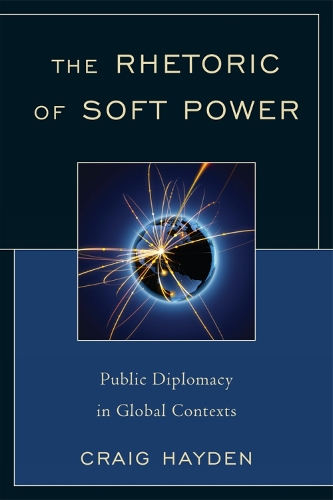
The Rhetoric of Soft Power: Public Diplomacy in Global Contexts
(Hardback)
Available Formats
Publishing Details
The Rhetoric of Soft Power: Public Diplomacy in Global Contexts
By (Author) Craig Hayden
Bloomsbury Publishing PLC
Lexington Books
23rd December 2011
United States
Classifications
Professional and Scholarly
Non Fiction
Semantics, discourse analysis, stylistics
International relations
Warfare and defence
327.1
Physical Properties
Hardback
308
Width 162mm, Height 241mm, Spine 24mm
612g
Description
The Rhetoric of Soft Power: Public Diplomacy in Global Contexts provides a comparative assessment of public diplomacy and strategic communication initiatives in order to portray how Joseph Nyes notion of soft power has translated into context-specific strategies of international influence. The book examines four casesJapan, Venezuela, China, and the United Statesto illuminate the particular significance of culture, foreign publics, and communication technologies for the foreign policy ambitions of each country.
This study explores the notion of soft power as a set of theoretical arguments about power, and as a reflection of how nation-states perceive what is an increasingly necessary perspective on international relations in an age of ubiquitous global communication flows and encroaching networks of non-state actors. Through an analysis of policy discourse, public diplomacy initiatives, and related programs of strategic influence, soft power in each case represents a localized set of assumptions about the requirements of persuasion, the relevance of foreign audiences to state goals, and the perception of what counts as a soft power resource. This timely analysis provides an unprecedented comparative investigation of the relationship between soft power and public diplomacy.
Reviews
Hayden (American Univ.) offers a welcome, much-needed analysis of what has become one of the most discussed concepts in international relations--soft power. Joseph S. Nye's concept of soft power has gained much attention in recent years, yet a thorough theoretical analysis has been sorely lacking. Hayden provides this analysis by merging this concept with the notion of public diplomacy, which he defines broadly as purposive attempts by actors to communicate in global media, cultural, and information spaces. In the author's own words, the book's goal is "to develop a theoretical treatment of soft power and public diplomacy through an interdisciplinary investigation of what is demonstratively a transnational, interdisciplinary phenomenon." The book succeeds in this goal. One of Hayden's main contributions is to not only offer a fresh analysis of US debates over the use of soft power in light of increased anti-Americanism in recent years. He also offers a rich comparative analysis of how soft power is deployed in the crucial states of China, Japan, and Venezuela, demonstrating how the key soft power notions of influence and persuasion are conceived of differently in different national contexts. Summing Up: Highly recommended. * Choice Reviews *
Scholars and practitioners of public diplomacy are certain to benefit from this thoughtful examination of the articulation of soft power. Public diplomacy is driven in part by the quality of rhetoric that is presented to global publics, and Craig Hayden does a fine job of analyzing the significance of communication in this important element of nations foreign policy. -- Philip Seib, University of Southern California
Hayden takes a complex area of increasing geopolitical significance and gives us a clear and direct road map. As states vie to determine the effects of their travails, Haydens comparative study is both timely and original. -- Monroe E. Price, University of Pennsylvania
Hayden has filled a gap in the comparative public diplomacy literature by illustrating how different visions of soft power can produce different public diplomacy practices, programs, and goals. His richly informed analysis of four major actors is guided by an original theoretical framework based on the scope, mechanism, and outcomes of soft power. -- R.S. Zaharna, American University
Author Bio
Craig Hayden is assistant professor of international communication at the School of International Service at American University. He has taught at the University of Virginias Department of Media Studies and at the University of Southern California Annenberg School for Communication. Craig was named a Research Fellow at the USC Center on Public Diplomacy in 2009. He blogs at the International Media Argument Project (www.intermap.org).
